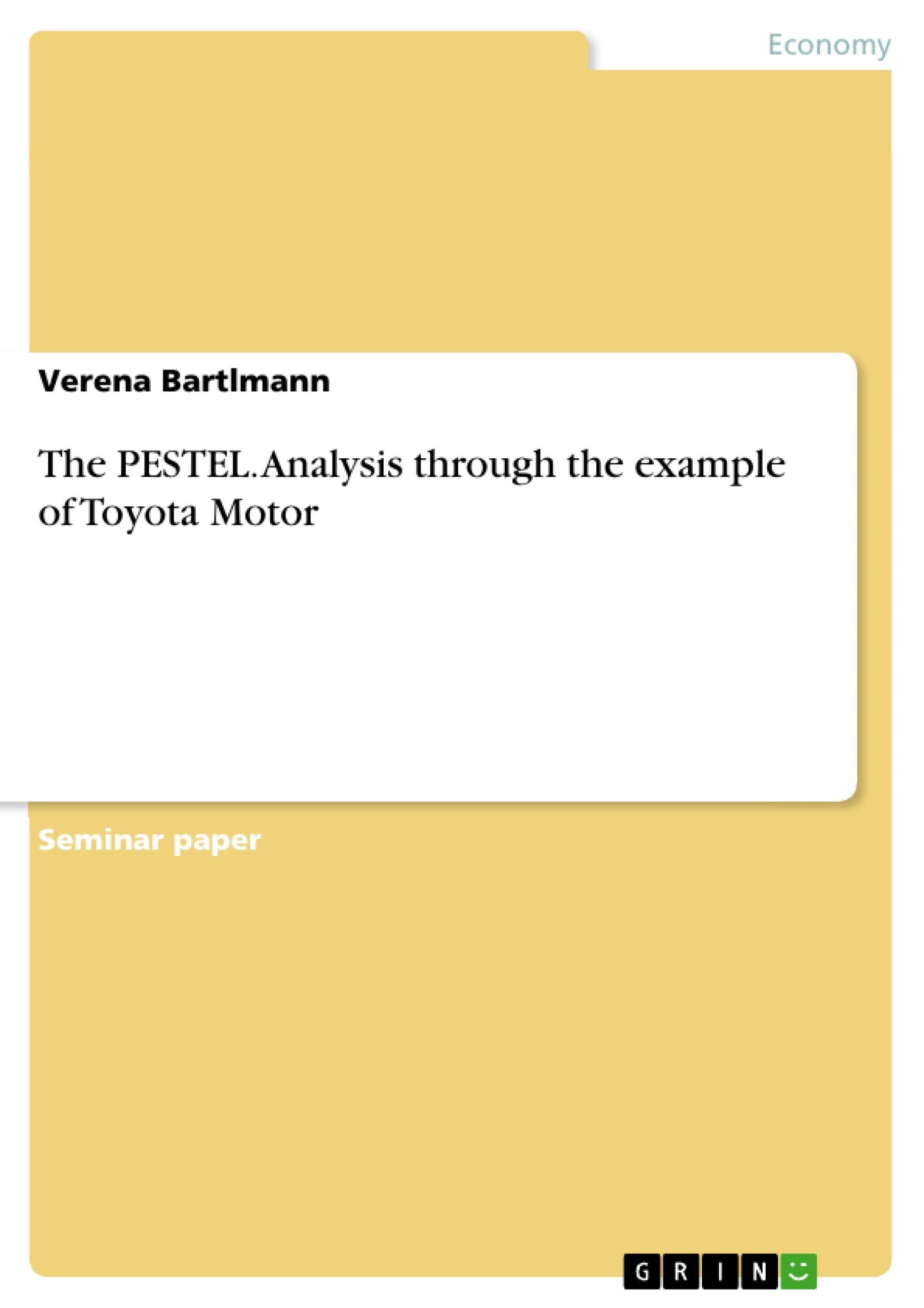The senior adviser and eight president from Toyota, Hiroshi Okuda, said in year 1997: “We wish to make Toyota not only strong, but a universally admired company, winning the trust and respect of the world. We must be a company that is accepted wholeheartedly by people around the world, who would think it natural if Toyota became No.1 in size, since we provide attractive products that excel in environmental protection and in safety.“. Do this quotation become reality? In this coursework, the Toyota Motor Corporation will be present with its presentation of company, mission, vision and also the range of products. After this, the mnemonic of PESTEL will be explained in chapter three. In addition the limitation of the PESTEL-Analysis will be shown. In Chapter four, the particular factors of the PESTEL-Analysis will be introduced by relating to Toyota Motor Corporation, but only in Germany, because otherwise it would be too extensive. The next chapter will deal with an overall evaluation/ assessment followed by recommendations for further strategic orientation which will complete this coursework.
Table of Contents
- Introduction
- The Presentation of the Company Toyota Motor Corporation
- The Company
- The Range of Products
- The Mission
- The Vision
- The PESTEL- Analysis
- The Fundamentals of PESTEL-Analysis
- Political
- Economic
- Socio-cultural
- Technological
- Legal
- Environment
- Limitation of PESTEL-Analysis
- The Fundamentals of PESTEL-Analysis
- The PESTEL-Analysis through the example of Toyota Motor Corporation
- Political
- Economic
- Socio-cultural
- Technological
- Legal
- Environment
- Overall Evaluation of Toyota Motor Corporation
- Recommendation for strategic focus of Toyota Motor Corporation
Objectives and Key Themes
This coursework aims to provide a comprehensive analysis of the Toyota Motor Corporation, focusing on its strategic management through the lens of the PESTEL framework. The paper examines the company's mission, vision, and range of products, and then explores the external factors that influence Toyota's operations in Germany.
- Strategic management of Toyota Motor Corporation
- Application of the PESTEL framework
- Analysis of external factors influencing Toyota's operations in Germany
- Evaluation of Toyota's current strategic direction
- Recommendations for future strategic focus
Chapter Summaries
- The introductory chapter establishes the context for the coursework by presenting Hiroshi Okuda's vision for Toyota. It also outlines the structure and scope of the paper.
- Chapter two provides an overview of the Toyota Motor Corporation, detailing its founding, key figures, employee base, financial information, and range of products. The chapter also touches on Toyota's participation in motorsports.
- Chapter three explains the PESTEL framework, outlining its fundamental elements and potential limitations.
- Chapter four applies the PESTEL analysis to Toyota Motor Corporation, specifically focusing on the German market. This chapter examines the political, economic, socio-cultural, technological, legal, and environmental factors affecting Toyota's operations in Germany.
- Chapter five offers an overall evaluation of Toyota Motor Corporation's strategic position, considering both internal and external factors.
Keywords
The primary focus of this coursework is on strategic management, the PESTEL framework, and its application to Toyota Motor Corporation in the German market. Key themes include the company's mission, vision, product range, external factors influencing its operations, and potential recommendations for future strategic focus.
- Quote paper
- Verena Bartlmann (Author), 2015, The PESTEL. Analysis through the example of Toyota Motor, Munich, GRIN Verlag, https://www.grin.com/document/434427




